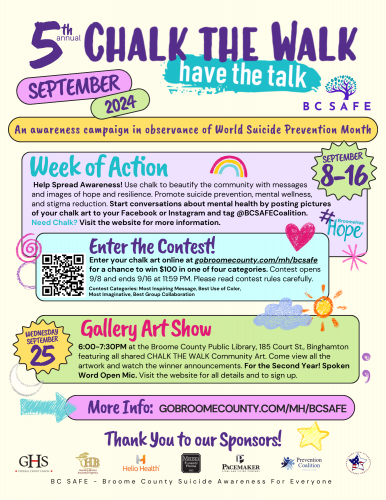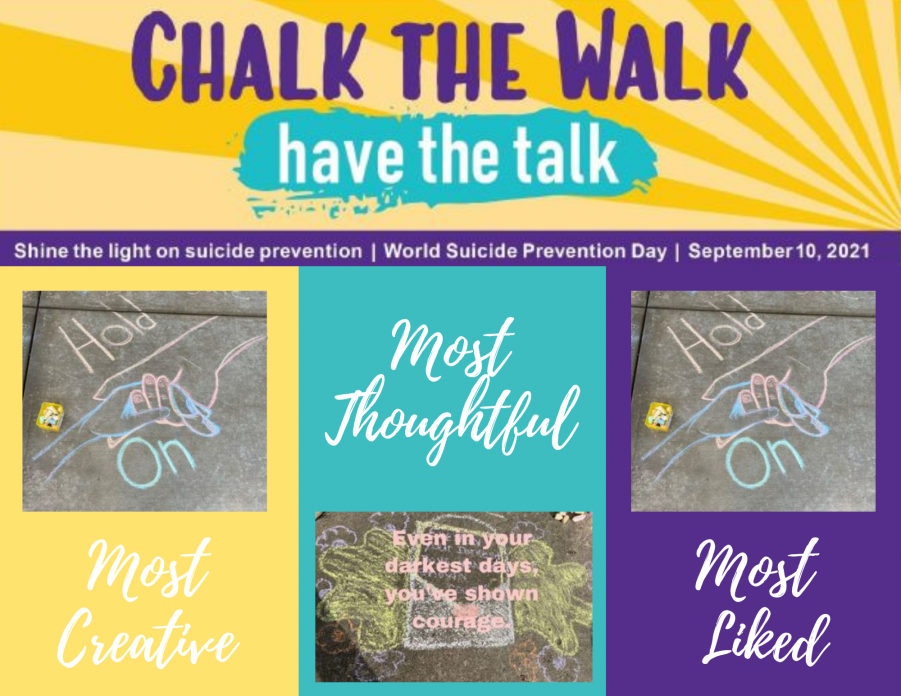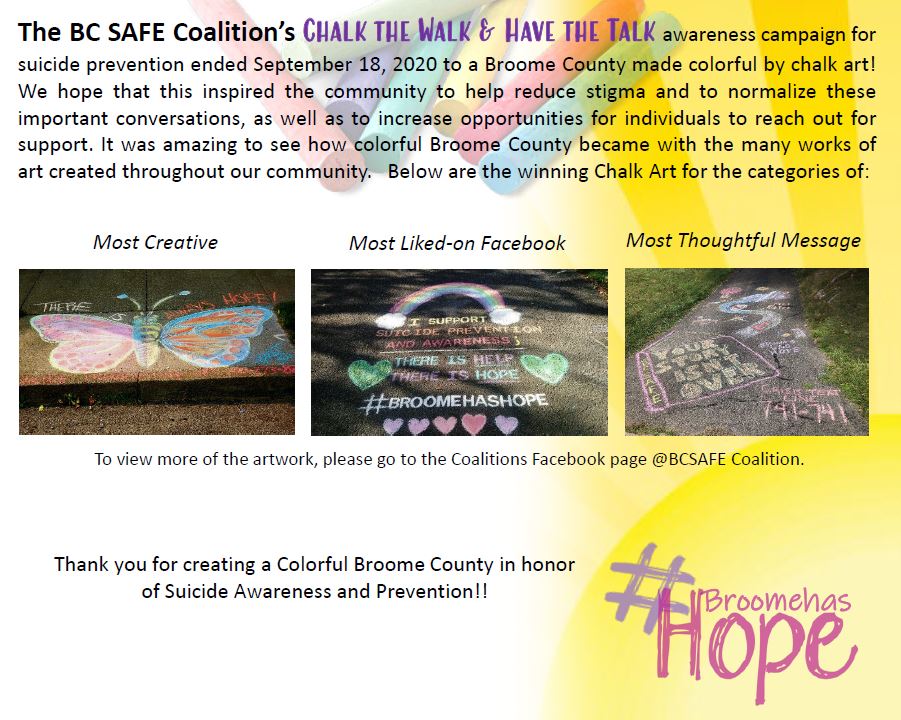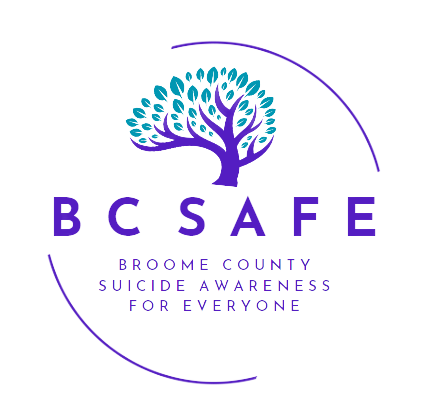
A local suicide prevention coalition in Broome County whose mission is to reduce the number of suicides and suicide attempts by increasing public awareness and providing educational and training resources.
IN A CRISIS? NEED TO TALK?
Local UHS CPEP @ 607-762-2302 or Dial 911
or Contact the Nationwide Resources Below
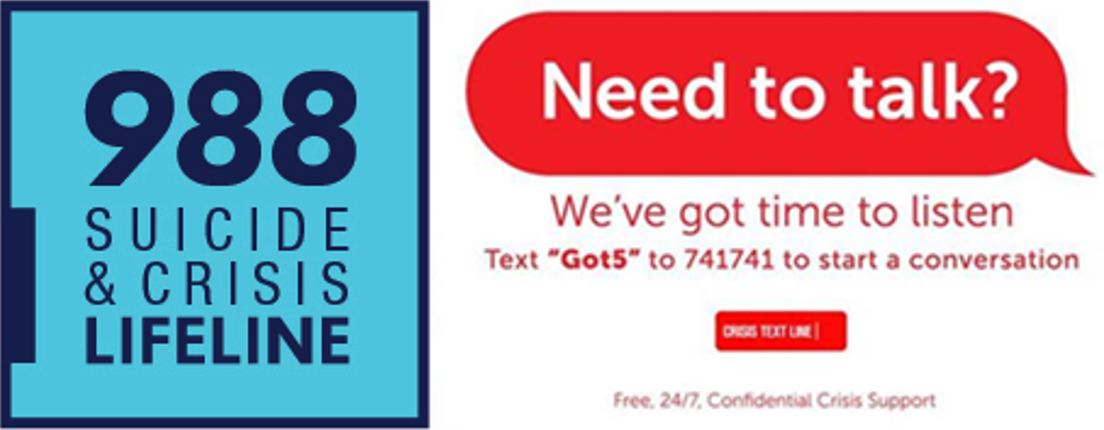
CURRENT EVENT
The 5th year of Chalk the Walk, Have the Talk will take place in the beginning of September
Look for more information to come!
Chalk the Walk, Have the Talk!
The goal of “Chalk the Walk” is to highlight Suicide Awareness and Prevention while encouraging community members, young and old, to “Have the Talk”.
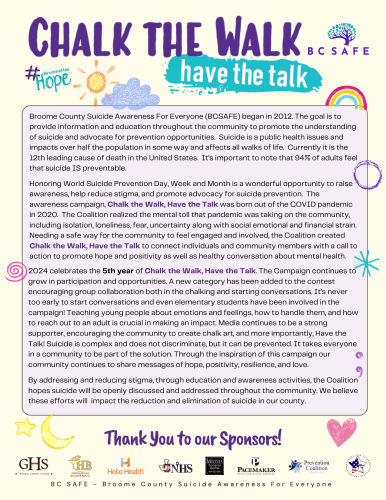
Check Us Out at:
About Us
BC SAFE began as Broome County Suicide Awareness For Families and Educators began in 2012 with a focus on coordinating suicide awareness and prevention efforts for youth and families alongside the educational systems. Much of the work focused on providing information and training to educators and the community, to promote the understanding of suicide and advocate for prevention opportunities. After reviewing relevant data for NYS and Broome County, it became evident that several demographic groups were at risk of suicide, including middle-aged men, veterans, and other specialized populations. This information guided a natural progression to address all these needs, and the coalition was rebranded to become Broome County Suicide Awareness For Everyone in 2018.
BC SAFE maintains a mission of reducing the number of suicides and suicide attempts by increasing public awareness and providing educational and training resources. Through addressing and reducing stigma, via education and awareness activities, the Coalition hopes suicide will be openly discussed and addressed throughout the community. We believe these efforts will be impactful on the reduction and elimination of suicide in our county.
 Information
Information
Q1: If you ask someone about suicide, does it put the idea into their head?
Asking someone about suicide is not harmful. There is a common myth that asking someone about suicide can put the idea into their head. This is not true. Several studies examining this concern have demonstrated that asking people about suicidal thoughts and behavior does not induce or increase such thoughts and experiences. In fact, asking someone directly, “Are you thinking of killing yourself,” can be the best way to identify someone at risk for suicide.
Q2: Do people threaten suicide to get attention?
Suicidal thoughts or actions are a sign of extreme distress and an alert that someone needs help. Any warning sign or symptom of suicide should not be ignored. All talk of suicide should be taken seriously and requires attention. Threatening to die by suicide is not a normal response to stress and should not be taken lightly.
Q3: What should I do if someone that I know is considering suicide?
If you or someone you know is in crisis has warning signs or symptoms of suicide, particularly if there is a change in the behavior or a new behavior, get help as soon as possible. Often, family and friends are the first to recognize the warning signs of suicide and can take the first step toward helping an at-risk individual find treatment with someone who specializes in diagnosing and treating mental health conditions. If someone is telling you that they are going to kill themselves, do not leave them alone. Do not promise anyone that you will keep their suicidal thoughts a secret. Make sure to tell a trusted friend or family member, or if you are a student, an adult with whom you feel comfortable.
(Adapted from National Institute of Mental Health - suicide FAQ)
Protective factors are personal or environmental characteristics that help protect people from suicide
- Major protective factors for suicide include:
- Connectedness to individuals, family, community, and social institutions
- Positive and supportive social relationships and community connections can help buffer the effects of risk factors in people’s lives
- Life skills
- Includes critical thinking, stress management, conflict resolution, problem-solving, ability to adapt to change and coping skills. Activities that enhance these skills can help people as they face new challenges, such as economic stress, divorce, physical illness, and aging
- Resilience is a related concept that includes traits such as a positive self-concept and optimism in addition to life skills. It is sometimes described as the ability to adapt to stress and adversity
- Self-esteem and a sense of purpose or meaning in life
- Cultural, religious, or personal beliefs that discourage suicide
(Adapted from Suicide Prevention Resource Center)
Risk factors are characteristics of a person, or their environment, that increase the likelihood that they may die by suicide:
- Mental disorders, particularly mood disorders, schizophrenia, anxiety disorders, and certain personality disorders
- Alcohol and other substance use disorders
- Hopelessness
- Impulsive and/or aggressive tendencies
- History of trauma or abuse
- Major physical illnesses
- Previous suicide attempt(s)
- Family history of suicide
- Recent Loss: Relationships; Job or financial; death of family member, relative or friend
- Easy access to lethal means
- Local clusters of suicide
- Lack of social support and sense of isolation
- Stigma associated with asking for help
- Lack of healthcare, especially mental health and substance abuse treatment
- Exposure to others who have died by suicide (in real life or via the media and Internet)
(Adapted from suicidepreventionlifeline.org)
Signs that someone is thinking about suicide. Although some do not, most people considering suicide will show signs that they are in distress.
People may be at risk if they:
- Talk about suicide or a plan for suicide
- Have a preoccupation with death and dying
- Are making statements of hopelessness, helplessness, or worthlessness
- Say things like, "I wish I were dead," "I shouldn't have been born," "I won't be a problem for you much longer"
- Talk about feeling trapped or in unbearable pain, or being a burden to others
- Show a loss of interest in usual activities
- Have changes with appetite and/or sleep
- Have trouble concentrating, difficulty with school work or work.
- Show marked personality changes, or frequent changes of mood
- Act angry, anxious, agitated, or are behaving recklessly
- Are isolating or distancing themselves from family and/or friends
- Start giving away prized possessions
(Adapted from Tioga County Suicide Prevention Coalition)
- If there is an immediate danger, call 911
- Crisis Textline: text Got5 to 741741
- Suicide Prevention Lifeline: 1-800-273-8255
- CPEP (Comprehensive Psychiatric Emergency Program) Binghamton General Hospital – 607-762-2302
- MHAST Mobile Crisis Team: 607-766-1369
- MHAST Peer Support Warm Line (24/7): 607-240-7291
- Trevor Project: 1-866-488-7386 or text START to 678678 (support for the LGBTQ community)
<<<If You Are With Someone Who Is In Immediate Danger, Or Concerned For Their Safety>>>
call UHS CPEP* at 607-762-2302 or Dial 911 *Comprehensive Psychiatric Emergency Program
In General -
Being part of the solution:
- Talk openly about mental health, and suicide awareness and prevention
- Attend a workshop, presentation or training on suicide awareness and/or prevention
- Be willing to have conversations
When you are concerned about someone’s mental health:
- Share your concern for how they are feeling
- Be direct but non-confrontational
- Listen with support and understanding
When you suspect someone may be suicidal:
- Stay calm, listen non-judgmentally, acknowledge concerns, convey understanding
- Don’t keep or agree to secrets that could lead to the person harming themselves. Tell them that you are taking what they say very seriously and that you can’t keep this information to yourself
- Ask if they are thinking about suicide
- Don’t leave the person alone AND get help from a trusted adult, teacher, counselor or professional
Other tips for communicating with someone you may be suicidal:
- Ask directly if they are thinking about suicide
- Listen non-judgmentally
- Be genuine, don’t preach or judge
- Avoid minimizing their problems, ensure they know you take them seriously
- Share your concerns about what you have noticed by simply describing what you have observed
(Adapted from Tioga County Suicide Prevention Coalition & Suicide Call Back Service)
If you have lost someone to suicide, you are not alone. There is a community of “loss survivors” made up of people who have been impacted by a suicide death
There is no right or wrong way to cope with a suicide loss
Losing someone to suicide shocks the senses and can leave loss survivors feeling that life is futile and unfair. You may be left with unanswered questions and struggle to understand. Complex grief can also leave loss survivors with feelings of guilt, blame, fear, and confusion
Visit the loss survivors pages at the American Foundation for Suicide Prevention (AFSP), the National Suicide Prevention Lifeline, and the American Association of Suicidology
(Adapted from https://www.preventsuicideny.org/)
Using language that is helpful and respectful encourages an environment free of stigma, where we can talk more openly and safely about mental health, suicide and its prevention. Words matter in a world where silence or insensitivity can make matters worse. The more open and safe communication is, the more likely people will offer and/or seek help.
Please check out these resources below.
Interested in learning how to become a member or for more information?
Please email BCSAFE@broomecountyny.gov

